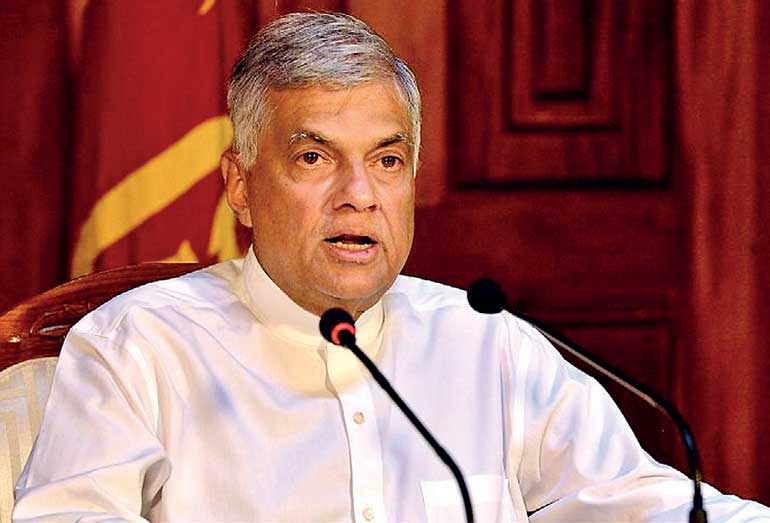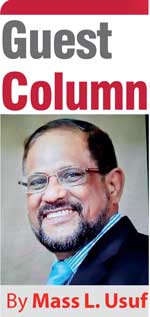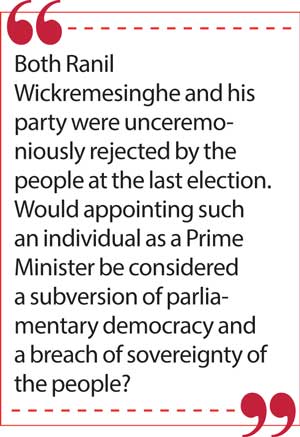Friday Feb 13, 2026
Friday Feb 13, 2026
Tuesday, 17 May 2022 02:30 - - {{hitsCtrl.values.hits}}

Prime Minister Ranil Wickremesinghe
The stability of a nation is assured when there is a stable government in force. We have a functioning parliament consisting of 225 members. A few are nominated and the majority elected by the people. Our Constitution also provides for an Executive President. In a representative democracy the Prime Minister and the Cabinet of Ministers constitute the government.
In constitutionalism, a government’s authority is determined by a body of laws called the Constitution. The Constitution is regarded as a form of checks and balances, guidance and rules for limited government. It seeks to prevent the dangers of arbitrary government, abuse or corruption in the use of power or authority and, as a check on rulers who govern wilfully to serve their own interests ignoring the general masses. We are, today, right in the middle of what constitutionalism desires to avert.
Sovereignty of people
According to Article 28 of our Constitution, it is a fundamental duty of every person to uphold and defend the Constitution in furthering national interest. The people who are the sovereign in this country (Article 3) should not permit the use of the law to serve as a tool for the benefit or advantage of a particular person, entity or position. The Members of Parliament must recognise that he/she draws authority, directly or indirectly, from the political sovereign – the Electorate, the people who voted him/her to power. The same principle applies to the President.
The High Court of Australia clarified sovereignty as follows:
“The sovereign power which resides in the people is exercised on their behalf by their representatives. The point is that the representatives who are members of Parliament and Ministers of State are not only chosen by the people but exercise their legislative and executive powers as representatives of the people. And in the exercise of those powers the representatives of necessity are accountable to the people for what they do and have a responsibility to take account of the views of the people on whose behalf they act.” (State of New South Wales vs. Commonwealth of Australia and another, 108 A.L.R. 577).
The distinguished Nigerian Professor and scholar of Constitutional law, Ben Nwabueze notes, “Constitutional restraints must not be ignored or bypassed if found inconvenient or bent to suit ‘political expediency’. We should not allow erosion of principles of constitutionalism.” 
The legitimacy of the law would be to ensure that the role of the political sovereign – the people – is not undermined. The very concept of responsible Government and representative democracy signifies Government by the People.
In the Indian case of Chaudhuri vs State Of Punjab & Ors (2001), the Appeal Court held: “The very concept of responsible Government and representative democracy signifies Government by the People. In constitutional terms, it denotes that the sovereign power which resides in the people is exercised on their behalf by their chosen representatives and for exercise of those powers, the representatives are necessarily accountable to the people for what they do.”
President’s constitutional responsibilities
People’s sovereignty includes the powers of government, (Article 3). The government comprises the President as the Head of the Executive, Prime Minister and the Cabinet of Ministers.
The Executive President in Sri Lanka is elected by the people. He is empowered by the people to exercise their sovereign power, (Article 4(b). In this exercise of power, on behalf of the people, the President is constitutionally bound by several principles:
(1) He must recognise that power resides in the people and not with him and to act in a manner which signifies Government by the People.
(2) He must exercise his executive powers as an elected representative of the people and solely on their behalf. Must ensure that his decision does not undermine the people’s power.
(3) In the exercise of his powers, by extension he is accountable to the people (though he is responsible to the Parliament) for what he does and has a responsibility to take account of the views of the people on whose behalf he acts.
(4) Must recognise that his powers are constitutionally subject to the overall sovereign power of the people. Therefore, he must not ignore or bypass this restraint for his convenience or bend it to suit ‘political expediency’.
Popular rejection
Apart from people’s powers of government, people’s sovereignty also includes Fundamental rights. Reading Article 3 with all that is encapsulated in Article 28 (a) to (f) on fundamental duties of every person in Sri Lanka, summarises the rationale behind the current crisis.
The incumbent President has put the entire nation in harm’s way economically, politically, racially and religiously. An unprecedented period that will be etched in the history of this nation as the “darkest era”. The people are experiencing it in real time. The people en masse are rejecting their elected representatives. They have been unceasingly calling for the resignation of the President, Prime Minister and the Cabinet. They want a clean government and a clean system of governance. Among their many demands, they want a system:
(1) Free from corruption, waste and misuse of public property.
(2) Devoid of nepotism, preferential treatment and discrimination.
(3) Fostering National unity
(4) To preserve and protect the environment and strategic assets.
(5) A government free of the corrupt Rajapaksa family.
(6) Revisiting the institution of Executive Presidency.
(7) Recovery of stolen assets and prosecution of politicians and bureaucrats.
(8) A complete overhaul of the governance system.
(9) And, many others.
In political science, a government’s political authority is legitimised through the consent of the public, not coercion. This consent is demonstrated by the popular acceptance and recognition by the people of the authority of the government. The popular rejection symbol by the ‘GotaGoHome’ chorus then becomes self-evident. Analysts say that the time is right for the President to leave, bowing in respect and, in honour to the will of the people.
Appointing Ranil
Both Ranil Wickremesinghe and his party were unceremoniously rejected by the people at the last election. Would appointing such an individual as a Prime Minister be considered a subversion of parliamentary democracy and a breach of sovereignty of the people?
It is well-known that the grand old party, the United National Party, slipped into the disastrous state it is today under Ranil’s watch. Most will remember UNP as a well-respected political party which secured an electoral victory with a 5/6th parliamentary majority in July 1977, under the leadership of late J.R. Jayewardene. Imagine such a party not being able to win at least one seat at the last election. Pathetically, Ranil himself came to the Parliament via the national list. What this literally means is that the people in whom rests sovereign power had simply discarded him.
The query of the constitutional validity of this appointment is now being raised. The Prime Minister must, under the Constitution, demonstrate that he has the majority in Parliament and that he has the confidence of the House. For this, normally, he should command a simple majority of minimum 113 members from his own party backing him and if numbers are insufficient an alliance with members of other parties. What is record breaking is that he is the only member of his party in Parliament.
The tragedy is that even from his electorate he had not been able to secure a seat for himself. What is the people’s sovereign power that he is representing then? How can such a person be appointed the Prime Minister?
Seervai in his treatise ‘Constitutional Law of India’, Silver Jubilee Edition, Fourth Edition, on page 2037: “Where the Constitution required the satisfaction of the President or the Governor for the exercise of any power or function by the President or the Governor as the case may be ... the satisfaction required by the Constitution is not the personal satisfaction of the President or the Governor but is the satisfaction of the President or of the Governor in the constitutional sense…”
President in violation
Accountability from the President is expected to ensure that the fundamental democratic values are upheld in a government of the people, by the people and for the people.
When the constitution bestows sovereignty on the people, it articulates the powers and rights of citizens. It becomes the responsibility of the Executive not to infringe such institutions, procedures or legislations when discharging his functions on behalf of the people. In context, a further question is, has the President violated his oath of office, to faithfully perform the duties and discharge the functions in accordance with the Constitution? Has he failed his oath by not upholding and defending the Constitution?
The President has no power to act in contravention of the Constitution. Article 33(h) is very clear about this, “…to do all such acts and things, not being inconsistent with the provisions of the Constitution…”
If true democracy must flourish and if a system change is the desire of the sovereign people, it is time that the culture of slavish subordination to the Executive ends. The Executive has to be held responsible for non-delivery of his constitutional responsibility.
The moral argument
The people’s sovereign power today, unfortunately, is seen not in the Parliament but in the ubiquitous ‘GotaGoHomeGamas’ around the country. Galle Face Green has become the nerve centre of this historic peaceful struggle. The intellectuals, academics, farmers, health staff, teachers, principals, artists, lawyers, doctors, engineers, transport personnel, civil society activists and the mass of the ordinary citizens are out on the streets with one loud refrain asking this government to literally “Go Home”! They also demand that the President resigns.
Around 40 government members of Parliament became independent in Parliament following the rejection by the masses. This is giving legitimacy to the sovereignty of people. Similarly, the people who elected the President now want him to resign. Has the President lost the moral legitimacy to continue in power? The people clearly reject the Rajapaksas, their family and their cronies both political and others. The public, it is alleged, has no doubt that Ranil is a Rajapaksa lackey. Therefore, they are sceptical if their call to recover the assets stolen by the Rajapaksas and their cohorts and the prosecution of the perpetrators would happen under the Ranil administration. In order to show the magical ‘113’ and retain Ranil, the Rajapaksas it is widely believed must now engage in the corrupt horse-trading culture of bribing members of Parliament. Also, rely on the present ‘people rejected’ set of government parliamentarians. The protestors want this type of unethical practices to be stopped, so they ask for a system change.
Broad judicial interpretation
In the context of exercising the constitutional sovereignty of the people and in the spirit of constitutionalism, can the appointment be considered a fair, reasonable and just discharge of the duties and functions of the President?
Is not this Executive decision amenable for challenge in the Supreme Court on the grounds of violation of the Constitution by the dereliction of duty and/or functions?
(The writer holds an LL.B (Hons) UK and is an Attorney-at-Law and former Legal and Corporate Advisor. He could be reached via email at: [email protected].)